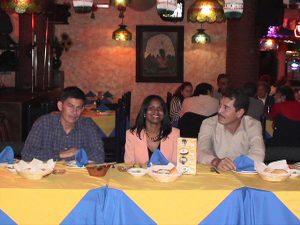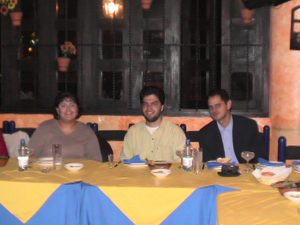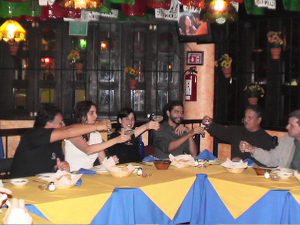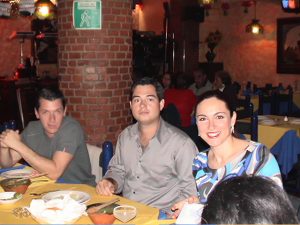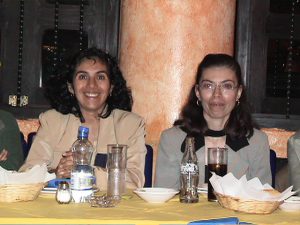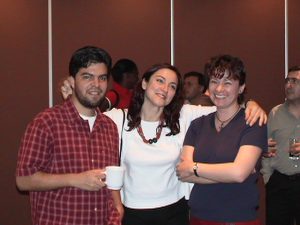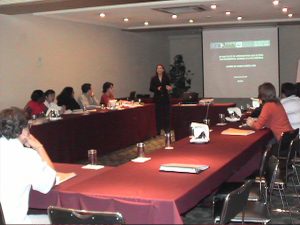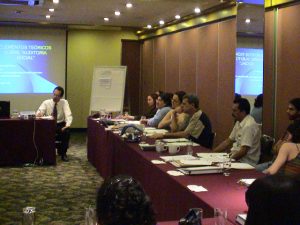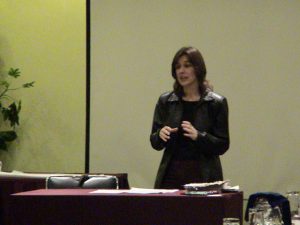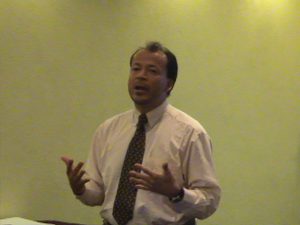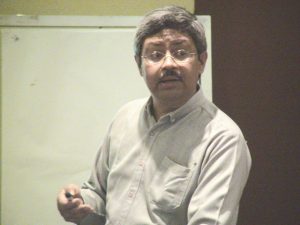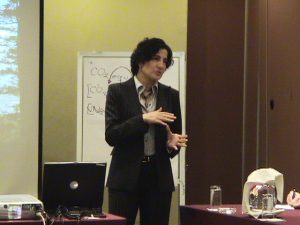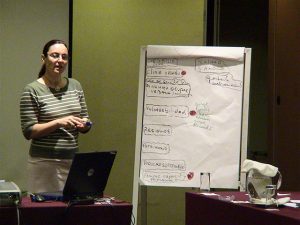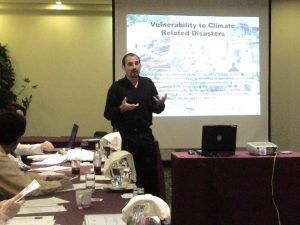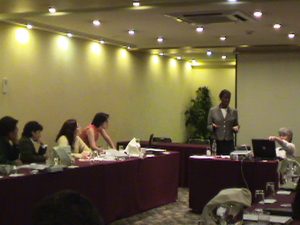IAI Institute on Urbanization and Global Environmental Change in Latin America


27 September – 08 October 2004 – Mexico City, Mexico
Objectives Participants Lecturers Program Photos Presentations Suggested readings
This Institute was held jointly by the IAI and the National Institute of Ecology of Mexico (INE). Additional collaborators were the International Human Dimensions Programme (IHDP) and The United States-Mexico Foundation for Science (FUMEC).
Objectives
The overarching goal of the Institute was to catalyze stronger interactions among academics, stakeholders, and policy and decision-makers from the countries of Latin America with respect to theories, models, methods, state policies and local initiatives related to Urbanization and Global Environmental Change and to capture the benefits and mitigate negative environmental and socioeconomic impacts.
Participants
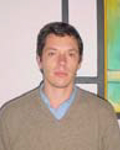 Fábian Rolando Bochaca
Fábian Rolando BochacaUniversity of Mendoza – National Council of Scientific and Technical Research (UM – CONICET) – Argentina
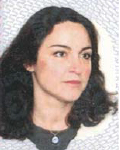 Marisa Cristina Sagua
Marisa Cristina SaguaMar del Plata National University – Environmental Research Center (UNMdP – CIAM) – Argentina
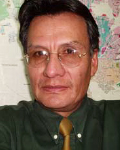 Cesar Rodolfo Mercado Mercado
Cesar Rodolfo Mercado MercadoUniversity of Cantabria – Catholic University of Bolivia – Harvard University (UC – UCB – Harvard) – Bolivia
 Maria Castellano
Maria CastellanoUniversity of São Paulo (USP) – Brazil
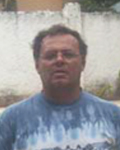 Rene Novaes
Rene NovaesUniversity of the Vale of the Paraíba – National Institute of Space Research – University of Taubaté (UNIVAP – INPE – UNITAU) – Brazil
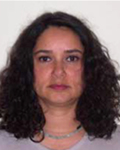 Olga Lucía Rodríguez Alvarez
Olga Lucía Rodríguez AlvarezNational University of Colombia – National Autonomous University of Mexico – Metropolitan Autonomous University (UNColombia – UNAM – UAM) – Colombia
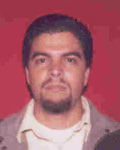 Luis Francisco Rodrígues Soto
Luis Francisco Rodrígues SotoNational University of Costa Rica – National Distance Education University – National Programme of Urban Development of Costa Rica (UNA – UNED – PNDU) – Costa Rica
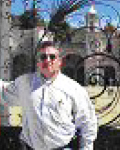 Alejandro Calvo Camacho
Alejandro Calvo CamachoNational Autonomous University of Mexico – Oaxaca Institute of Technology (UNAM – ITO) – Mexico
 Claudia Maria Martinez Peralta
Claudia Maria Martinez PeraltaMonterrey Institute of Technology and Higher Education – Institute of the Environment and Sustainable Development of the State of Colima (ITESM – IMADES) – Mexico
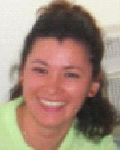 Elizabeth Mar Juárez
Elizabeth Mar JuárezNational Autonomous University of Mexico – Mexican Petroleum Institute (UNAM – IMP) – Mexico
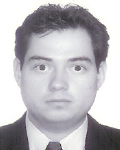 Mauricio Cecilio Domínguez Aguilar
Mauricio Cecilio Domínguez AguilarThe Center for Research and Advanced Studies of the National Polytechnic Institute – National Autonomous University of Mexico (CINVESTAV – UNAM) – Mexico
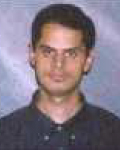 Romer Altamirano Guerrero
Romer Altamirano GuerreroNational University of Engineering, Managua – Central American University (UNI – UCA) – Nicaragua
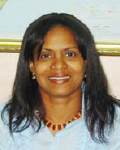 Caridad Pérez
Caridad PérezUniversity of Costa Rica – The National Meteorology Office (UCR – ONAMET) – Dominican Republic
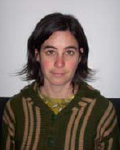 María José Lombardi Dubourdieu
María José Lombardi DubourdieuNational University of the Republic (UDELAR) – Uruguay
 Lila de Lourdes Franco Cordero
Lila de Lourdes Franco CorderoCarleton University (Ottawa) – Universidad Centroccidental Lisandro Alvarado (Carleton – UCLA) – Venezuela
The College of the Northern Border (Colef) – Mexico
National Institute of Ecology (INE) – Mexico
National Autonomous University of Mexico (UNAM) – Mexico
University of La Habana – United Nations (UH – ONU) – Cuba
Bolivia
Costa Rica
Cuba
Jamaica
Puerto Rico
Lecturers
Stanford University – USA
The College of Mexico (COLMEX) – Mexico
Universidad Católica de Chile (UC) – Chile
University of California (UC) – USA/México
University of Buenos Aires – Social and Environmental studies center (UBA – CESAM) – Argentina
National Autonomous University of Mexico (UNAM) – Mexico
University of Sao Paulo (USP) – Brazil
Mexican Institute of Transportation – Mexico
National Autonomous University of Mexico (UNAM) – Mexico
Metropolitan Autonomous University (UAM) – México
National Institute for Space Research (INPE) – Brazil
University of Veracruz (UV) – Mexico
National University of Quilmes (UNQ) – Argentina
National Institute of Ecology (INE) – Mexico
National Autonomous University of Mexico (UNAM) – Mexico
Metropolitan Autonomous University Xochimilco (UAM-X) – Mexico
Federal District Department (DDF) – Mexico
Federal District Department (DDF) – Mexico
University of São Paulo (USP) – Brazil
University of Michoacana – Mexico
National Autonomous University of Mexico (UNAM) – Mexico
The United States-Mexico Foundation for Science – Mexico
National Autonomous University of Mexico – National Institute of Ecology (UNAM – INE) – Mexico
Centre for Research and Higher Learning in Social Anthropology (CIESAS) – Mexico
Arizona State University (ASU) – USA
National Autonomous University of Mexico (UNAM) – Mexico
Meteorology Institute of Cuba (INSMET) – Cuba
National Institute of Ecology (INE) – Mexico
– Lecturers’ CVs English
– Information about the coordinator: Roberto Sánchez
Program
Theme Description and Structure of the Program
Urban areas are complex systems created by social processes and their interactions with the landscape. Urban growth, form, function and life are the end result of a broad range of economic, cultural, social, political and technological processes that interact dynamically among themselves and which ultimately modify the biophysical environment. Land use patterns, the reshaping of the landscape, and the form of the built environment are the physical manifestations of the interaction of those processes. In Latin America, about seventy five percent of the population, approximately 330 million people, is estimated to live in urban areas (UNCHS 2002). Poverty in Latin America is increasingly urbanized due to the continent’s fast rate of urbanization and the overall increase in poverty and inequality there (World Bank 2001). The World Bank estimates that five out of every six additional poor people between 1986 and 1998 in that region were based mainly in urban areas (World Bank 2002).
The increasing frequency and magnitude of climate-related natural disasters in urban areas during the last decade are some of the clearest indicators of the importance of those impacts. However, climate change is only one of a number of global environmental changes affecting urban areas. Research oriented to study these issues requires multidimensional and integrative perspectives capable of overcoming the limitations of current approaches focusing on environmental problems isolated from their social, political, economical, and cultural. Critical in this regard is a better understanding of the interactions among social, cultural, economic, political, and biophysical dimensions and how they shape the urbanization process, and how this process shape and is shaped by global environmental change.
Read more:
English PDF
Spanish PDF
Program PDF
Download PDF file (English)
Presentations
– Introduction: Urbanization and Global Environmental Change – Roberto Sanchez
– Urbanization and Global Environmental Change – Roberto Sanchez
– Global Environmental Change biophysical processes – Karen Seto
– World Economy Trends (Spanish) – Alejandro Nadal
– Global Environmental Change in Latin America (Spanish) – Carlos Mattos
– Urbanization and Global Environmental Change – Roberto Sanchez
– Urban form, infrastructure and social justice – Ricardo Toledo
– Introduction: Urban Function, transport and economy (Spanish) – Victor Islas
– The analytical planning process for transportation demand (Spanish) – Victor Islas
– Advantages and obstacles in Urban Modelling – Claudia Almeida
– Abstract Dra. Cláudia Maria de Almeida
– The social construction of the urban space (Spanish) – Emilio Duhau
– The social construction of the urban space (Spanish) – Emilio Duhau
– Urbanization and Carbon cycle – Patricia Romero
– Climate action local strategy in Mexico City (Spanish) – Oscar Vázquez
– Health and Climate Change (Spanish) – Ana Rosa Moreno
– Urbanization and Global Environmental Change (Spanish) – Ernesto Jauregui
– Abstract Dr. Ernesto Jáuregui Ostos (Spanish)
– Ecologic services in urban areas (Spanish) – Roberto Sanchez
– Urban geomorphology (Spanish) – Gerardo Bocco
– Urban areas and global environmental change (Spanish) – Virginia Garcia
– Climate Change in Varadero (Spanish) – Barbaro Moya
– Abstract Dr. Barbaro Moya
– Change in land use and urbanization – Erna Lopez
Suggested readings
Suggested readings for the Training Institute Globalization and urbanization in Latin America
Mattos, C. “Redes, Nodos y Ciudades. Transformación de la Metrópoli Latinoamericana.”
Urban Structure
Lima, J.J. “Socio-spatial segregation and urban form: Belem at the end of the 1990s.”
Urban function and transport
Badoe, D. and Miller, E. “Transportation land-use interactions: empirical findings in North America and their implications for modeling.”
The social construction of the urban space
Rolnik, R. “Territorial exclusion and violence: The case of the state of Sao Paulo, Brazil. »
Urban governance
Lyons, M, Smuts, C, and Stephens, A. “Participation, Empowerment and sustainability.: (how) do these links work.”
Rakodi, C. “Forget planning, put politics first? Priorities for urban management in developing countries.”
Peri-urban areas
Aguilar, A. and Ward, P. “Globalization, Regional Development and Mega-city expansion in Latin America. Analyzing Mexico City’s peri-urban hinterland.”
The urban environment- Air quality
Marquez, L. Smith, N. “A framework for linking urban form and air quality.”
Urbanization and the carbon cycle
Soegaard, H. and Moller-Jensen, L. ”Toward a spatial CO2 budget of a metropolitan region based on a textural classification and flux measurements.”
The urban environment- water
Foster, S. “The interdepence of groundwater and urbanization in rapid developing cities.”
The urban environment- solid waste
Baud, I. et.al. “Quality of life and alliances in solid waste management.”
Urban climate
Jauregui, E. “Urban effects ofn convective precipitation in Mexico City”
Jauregui, E. “Heat Island Development in Mexico City.”
Climate change and health
Patz, J. and Balbus, J. “Methods for assessing public health vulnerability to global climate change.”
Urban geomorphology
Gupta, A. and Ahmad, R. “Geomorpholy and the urban tropics. Building an interface between research and usage.”
Ecological Services and Urban agriculture
Bolum, P. and Hunhammar, S. “Ecosystem services in urban areas,”
Santandreu, A., Lapetina, R., Beisnday, R, and Gonzalez, A. “La Agricultura urbana en barrios populares, la experiencia de los Bulevares.” En Santandreu, A., La agricultura urbana en la ciudad de Montevideo.
Vulnerability
Adger, N. “Social vulnerability to climate changes and extremes in Coastal Vietnam.”
Hamza, M. and Zetter, R. “Structural adjustment, urban systems and disaster vulnerability in developing countries.”

